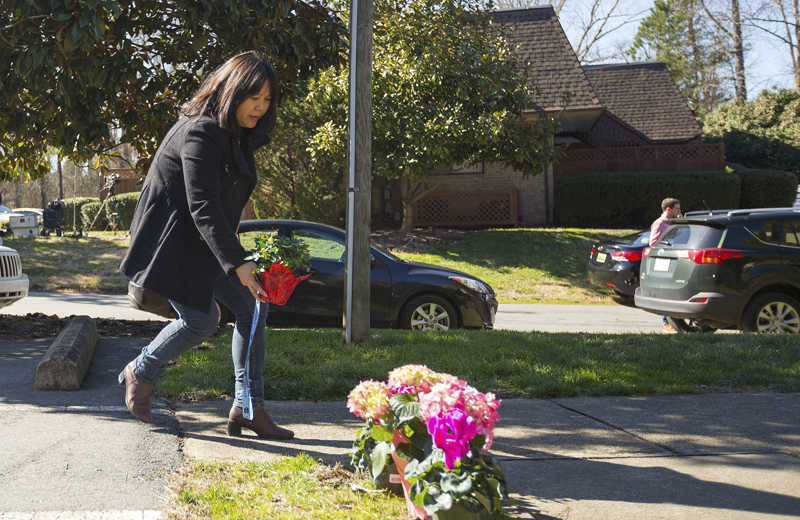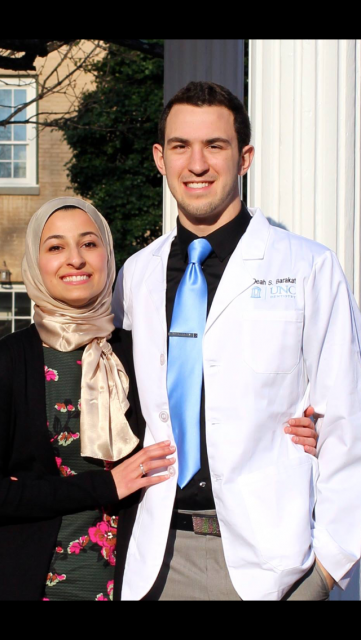
A woman places flowers near a building where three young Muslims were killed last month in Chapel Hill, N.C. Photo courtesy of REUTERS/Chris Keane *Editors: This photo may only be republished with RNS-UNC-MUSLIMS, originally transmitted on Feb. 11, 2015, and RNS-MUSLIM-DEATHPENALTY, originally transmitted on March 4, 2015.
DURHAM, N.C. (RNS) News that prosecutors plan to seek the death sentence for a man accused of killing three Muslim students in Chapel Hill last month drew a mixed reaction from the local Muslim community.
While many activists welcomed the move, the family of Deah Barakat, the University of North Carolina dental student who was shot dead along with his wife and sister-in-law on Feb. 10, chose not to enter the fray.
“Right now, we’re not commenting on the death penalty at all,” said Farris Barakat, Deah Barakat’s brother.
Durham County District Attorney Roger Echols filed notice in court that he plans to seek the death sentence if Craig Stephen Hicks is convicted of first-degree murder.
Hicks is accused of entering the condominium owned by Barakat and shooting and killing him; his wife, Yusor Mohammad Abu-Salha, 21; and her sister, Razan Mohammad Abu-Salha, 19.
Activists in the Muslim community met at a private home earlier this week and discussed the death penalty option.
“People felt the death penalty is justified in this case,” said Khalilah Sabra, executive director of the Muslim American Society Immigrant Justice Center, who attended the meeting. “It would show the justice system is fair.”

Deah Shaddy Barakat, 23, and his wife, Yusor Mohammad Abu-Salha, 21, were killed Feb. 10, 2015, inside their condominium near the University of North Carolina campus in Chapel Hill. Photo courtesy of Omid Safi
North Carolina has not executed anyone since 2006, when a series of lawsuits challenged the humanity and fairness of capital punishment. About 150 prisoners are on death row in the state, and juries issued three new death sentences in 2014.
But more than the death penalty, the Muslim community wants a deeper investigation into the allegation of religious bias and the possibility of federal hate crimes. Federal investigators have opened such an investigation.
Police say the shootings were the result of a long-running parking dispute, a claim rejected by many local Muslims. A New York Times story on Wednesday (March 3) reported that none of the slain students was parked in Hicks’ space in the Finley Forest complex, two miles from the UNC campus, on the day of the shootings, and that the newlywed couple had taken steps to appease their angry neighbor.
Hicks has confessed to the killings.
A hearing is set for next month on Echols’ request to seek the death penalty.
Islam allows for capital punishment for crimes of suitable severity, though it also recommends forgiveness. Some predominantly Muslim countries, such as Saudi Arabia, use capital punishment for a large variety of crimes. Others, such as Albania and Bosnia, rarely use it.
Mohamed Elgamal, chairman of the Islamic Association of Raleigh, said the death penalty was not the community’s overriding concern. He pointed to the scholarships established by Raleigh’s N.C. State University in the name of three family members who attended the university, saying that’s how the community wants to honor the victims.
“We’re not out there looking for revenge,” he said. “Our focus is more constructive — to continue the legacy of these three people.”
KRE/MG END SHIMRON




